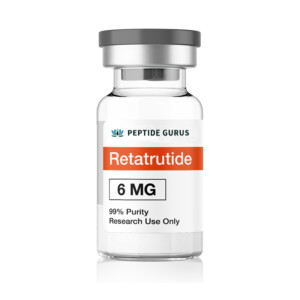Retatrutide is a promising new medication that has garnered significant attention in the medical community. This drug is primarily used for the treatment of various metabolic disorders, including obesity and type 2 diabetes. The unique mechanism of action for Retatrutide involves the modulation of specific hormonal pathways that regulate appetite and insulin sensitivity. By targeting these pathways, Retatrutide helps to reduce body weight and improve glycemic control, making it a valuable option for patients struggling with these conditions.
One of the most notable uses of Retatrutide is in the management of obesity. Obesity is a chronic condition that affects millions of people worldwide and is associated with numerous health complications such as cardiovascular disease, hypertension, and certain types of cancer. Retatrutide works by influencing the brain’s appetite control centers, leading to reduced hunger and increased feelings of satiety. Clinical trials have shown that patients taking Retatrutide experience significant weight loss compared to those on placebo, highlighting its potential as an effective weight management tool.
In addition to its role in weight management, Retatrutide is also used to improve glycemic control in individuals with type 2 diabetes. Type 2 diabetes is characterized by insulin resistance and high blood sugar levels, which can lead to serious complications if not properly managed. Retatrutide enhances insulin sensitivity and promotes better glucose uptake by the body’s cells, thereby helping to lower blood sugar levels. This dual action of weight reduction and improved glycemic control makes Retatrutide a particularly attractive option for patients with type 2 diabetes who are also overweight or obese.

The safety profile of Retatrutide has been extensively studied in clinical trials. Most side effects reported are mild to moderate in nature and include gastrointestinal symptoms such as nausea, vomiting, and diarrhea. These side effects are generally transient and tend to diminish over time as the body adjusts to the medication. It is important for patients to follow their healthcare provider’s instructions regarding dosage and administration to minimize the risk of adverse effects and to achieve the best possible outcomes.
Retatrutide’s impact on cardiovascular health is another area of interest. Obesity and type 2 diabetes are major risk factors for cardiovascular disease, and effective management of these conditions can significantly reduce the risk of heart attacks, strokes, and other cardiovascular events. Studies have shown that Retatrutide not only helps to lower body weight and improve blood sugar levels but also has beneficial effects on blood pressure and lipid profiles. These findings suggest that Retatrutide could play a crucial role in comprehensive cardiovascular risk management for patients with metabolic disorders.
The administration of Retatrutide is typically done through subcutaneous injections, which are administered once weekly. This convenient dosing schedule helps to improve patient adherence compared to medications that require daily administration. Patients should be properly trained on how to self-administer the injections and should follow their healthcare provider’s guidance to ensure correct usage. Regular follow-up appointments are also important to monitor the medication’s effectiveness and to make any necessary adjustments to the treatment plan.
Retatrutide is not suitable for everyone, and certain contraindications must be considered before starting treatment. Patients with a history of severe hypersensitivity to any component of the drug, or those with a personal or family history of medullary thyroid carcinoma or multiple endocrine neoplasia syndrome type 2, should not use Retatrutide. Additionally, caution is advised in patients with a history of pancreatitis, as the drug may increase the risk of this condition. A thorough medical evaluation and discussion with a healthcare provider are essential to determine if Retatrutide is an appropriate treatment option.
The potential for drug interactions is another important consideration when prescribing Retatrutide. Patients should inform their healthcare provider of all medications they are currently taking, including over-the-counter drugs and supplements, to avoid any harmful interactions. Retatrutide may interact with other medications that affect blood sugar levels, such as insulin or oral hypoglycemic agents, and dose adjustments may be necessary to prevent hypoglycemia. Regular monitoring of blood sugar levels is crucial for patients taking Retatrutide in combination with other diabetes medications.

Research into the long-term effects of Retatrutide is ongoing, and future studies will provide more insights into its safety and efficacy. Preliminary data from clinical trials are promising, but it is important to continue monitoring patients for any potential long-term adverse effects. Healthcare providers should stay informed about the latest research findings and updates to clinical guidelines to ensure they are providing the best possible care for their patients.
In summary, Retatrutide is a valuable addition to the therapeutic arsenal for the management of obesity and type 2 diabetes. Its ability to reduce body weight, improve glycemic control, and positively impact cardiovascular health makes it a multifaceted treatment option. While it is not suitable for all patients, those who meet the criteria for its use may experience significant health benefits. Ongoing research and clinical experience will continue to shape our understanding of Retatrutide’s role in managing metabolic disorders.
Retatrutide’s development represents a significant advancement in the field of metabolic disorder treatment. The drug’s mechanism of action, which involves the modulation of hormonal pathways, sets it apart from other weight loss and diabetes medications. By targeting the underlying physiological processes that contribute to obesity and insulin resistance, Retatrutide offers a more comprehensive approach to treatment. This innovative approach has the potential to improve patient outcomes and quality of life.
Patient education is a critical component of successful Retatrutide therapy. Patients should be fully informed about the benefits and potential risks of the medication, as well as the importance of adherence to the prescribed treatment regimen. Healthcare providers should take the time to discuss the expected outcomes, possible side effects, and the need for regular follow-up appointments. Empowering patients with knowledge and support can enhance their engagement in their treatment and improve overall health outcomes.
The cost of Retatrutide may be a consideration for some patients, as newer medications can be expensive. Insurance coverage and patient assistance programs can help to offset the cost, but it is important for patients to discuss their financial concerns with their healthcare provider. Providers can offer guidance on navigating insurance benefits and may be able to suggest alternative resources for financial assistance. Ensuring that patients have access to the medications they need is essential for effective disease management.
Lifestyle modifications are an important adjunct to Retatrutide therapy. Patients should be encouraged to adopt healthy eating habits, engage in regular physical activity, and make other lifestyle changes that support weight loss and glycemic control. Combining Retatrutide with lifestyle interventions can enhance the medication’s effectiveness and lead to more sustainable health improvements. Healthcare providers should offer resources and support to help patients make these changes and maintain them over the long term.
Retatrutide’s potential extends beyond the treatment of obesity and type 2 diabetes. Ongoing research is exploring its use in other metabolic and endocrine disorders, such as non-alcoholic fatty liver disease (NAFLD) and polycystic ovary syndrome (PCOS). These conditions share common underlying mechanisms with obesity and diabetes, and Retatrutide’s ability to modulate hormonal pathways may offer therapeutic benefits. Future studies will help to clarify the drug’s efficacy in these additional indications.
The role of Retatrutide in personalized medicine is another area of interest. Personalized medicine involves tailoring treatment to the individual characteristics of each patient, such as their genetic makeup, lifestyle, and comorbid conditions. Retatrutide’s targeted mechanism of action makes it a candidate for personalized treatment approaches. By identifying patients who are most likely to benefit from Retatrutide, healthcare providers can optimize treatment outcomes and reduce the risk of adverse effects.
Patient adherence to Retatrutide therapy is crucial for achieving the desired outcomes. Non-adherence can lead to suboptimal results and may increase the risk of complications. Healthcare providers should regularly assess adherence and address any barriers that patients may face. Strategies such as simplifying the treatment regimen, providing education and support, and involving patients in decision-making can help to improve adherence and enhance the effectiveness of Retatrutide therapy.
The integration of Retatrutide into clinical practice requires a multidisciplinary approach. Healthcare providers from various specialties, including endocrinologists, cardiologists, and primary care physicians, should work together to develop comprehensive treatment plans for patients. Collaboration and communication among healthcare providers can ensure that all aspects of a patient’s health are addressed and that Retatrutide is used effectively as part of a broader treatment strategy.
Retatrutide’s impact on quality of life is an important consideration for patients and healthcare providers. Effective management of obesity and type 2 diabetes can lead to significant improvements in physical health, mental well-being, and overall quality of life. Patients who experience weight loss and better glycemic control may also see improvements in their energy levels, mobility, and self-esteem. These positive changes can enhance patients’ daily lives and contribute to long-term health and happiness.
The future of Retatrutide is promising, with ongoing research and development efforts focused on expanding its therapeutic applications and improving its safety and efficacy. As new data emerge, healthcare providers will have more information to guide their clinical decisions and optimize patient care. Retatrutide represents a significant advancement in the treatment of metabolic disorders, and its continued evolution will likely bring further benefits to patients in the years to come.
PeptideGurus is a leading supplier of American-made research peptides, offering top-quality products at competitive prices. With a focus on excellence and customer service, they ensure a secure and convenient ordering process with global shipping.
© Copyright Peptide Gurus 2024. All rights reserved.
All products on this site are for Research, Development use only. Products are Not for Human consumption of any kind. The statements made within this website have not been evaluated by the US Food and Drug Administration or HEALTH CANADA. The statements and the products of this company are not intended to diagnose, treat, cure or prevent any disease.
PeptideGurus is a chemical supplier. PeptideGurus is not a compounding pharmacy or chemical compounding facility as defined under 503A of the Federal Food, Drug, and Cosmetic act. Peptide Sciences is not an outsourcing facility as defined under 503B of the Federal Food, Drug, and Cosmetic act.
CONTACT